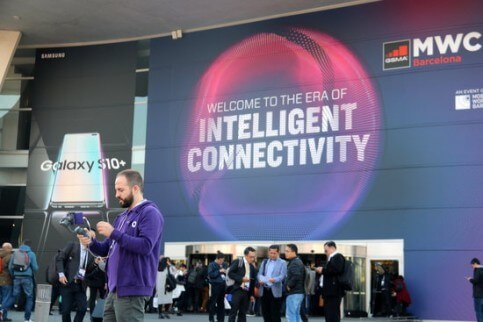The world’s largest trade fair for the mobile industry, the Mobile World Congress (MWC), has officially opened its doors in Barcelona, ready to show off the latest mobile technology to over 100,000 people from all over the world expected to visit the event.
This year’s show focuses on smart connectivity through the fusion of 5G, artificial intelligence and the ‘Internet of Things’. The trade fair in the Gran Via venue, which runs until 28 February, welcomes more than 2,400 exhibitors from over 200 countries.
5G is on track to account for 15% of global mobile connections by 2025, as the number of 5G network launches and compatible devices ramps up this year, according to a new GSMA report.
The 2019 global edition of the GSMA’s flagship Mobile Economy report series – published today at the Mobile World Congress (MWC) in Barcelona – reveals that a further 16 major markets worldwide will switch on commercial 5G networks this year, following on from the first 5G launches in South Korea and the US in 2018.
It is calculated that mobile operators worldwide are currently investing around $160 billion per year on expanding and upgrading their networks, despite regulatory and competitive pressures.

‘The arrival of 5G forms a major part of the world’s move towards an era of Intelligent Connectivity, which alongside developments in the Internet of Things, big data and artificial intelligence, is poised to be a key driver of economic growth over the coming years,’ said Mats Granryd, Director General of the GSMA.
‘While 5G will transform businesses and provide an array of exciting new services, mobile technology is also helping to close the connectivity gap. We will connect more than a billion new people to the mobile internet over the next few years, spurring adoption of mobile-based tools and solutions in areas such as agriculture, education and healthcare, which will improve livelihoods of people around the world.’
According to the report, mobile technologies and services generated 4.6% of GDP globally last year, a contribution that amounted to $3.9 trillion of economic value added.
This contribution is forecast to grow to $4.8 trillion (4.8% of GDP) by 2023 as countries around the globe increasingly benefit from the improvements in productivity and efficiency brought about by increased take-up of mobile services.
The mobile ecosystem also supported almost 32 million jobs in 2018 (directly and indirectly) and made a substantial contribution to the funding of the public sector, with more than $500 billion raised through general taxation.
Looking further ahead, it is forecast that 5G will contribute $2.2 trillion to the global economy over the next 15 years, with key sectors such as manufacturing, utilities, and professional and financial services benefitting the most from the new technology.


